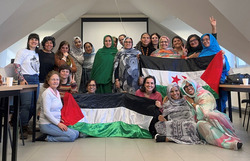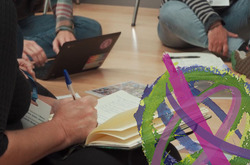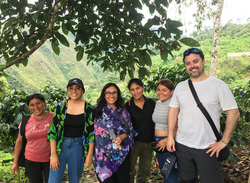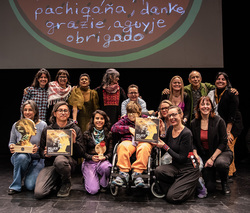
Women who write about exile and returning
Unsought changes, loneliness, rootlessness. Fear and pain caused by having to leave what's familiar, relatives and friends. On 15 December, the Internodal Gender Group to support the legacy of the Truth Commission in Colombia organised a virtual debate to talk about what it means for women to write about exile and returning.
The debate was guided by Leonor Solano González, a Colombian exile in Brazil and facilitator at “spontaneous writing” processes with migrant and refugee women; Mariana Schmidt Quintero, resident in Berlin, facilitator of the writing process that resulted in the book Exilios y lejanías. Relatos de mujeres colombianas, and Yazmin Muñoz Cárdenas, from the Cauca department, facilitator of “women's circles” to write monologues with returnee women. The event was moderated by the coordinator of the Internodal Gender Group, Claudia Rodríguez Tribin.
Each speaker explained the methodologies, achievements and challenges of their experiences, and later there was an exchange of ideas with twenty-two women who went to the dialogue, based on the question “what happens when we women write?” They pointed out that to write is to “look at oneself in the mirror”, an exercise in confronting oneself and a process which as women allows us to “be, manifest ourselves and resignify ourselves”. Writing by women troubles, reflects, incites and transforms.
“The spontaneous enables self-knowledge and developing creativity”, said Leonor, while Yazmin pointed out that “the experience of writing helps to create, recreate and heal”. Mariana highlighted the fact that women's writing is personal, social and political. Personal, because it addresses each woman’s life, opens padlocks of memory and touches on pains that soothe. Social, because the pain is shared and the feeling of loneliness is mitigated with the lives of others. And political, because what is made visible opens worlds and encourages others to talk, to narrate.
Exiles and distances
With the support of the Hegoa Institute it has recently published the book Exilios y lejanías. Relatos de mujeres colombianas, with funding from the Basque Government and in collaboration with the Swedish Foundation for Human Rights, the International Catalan Institute for Peace (ICIP) and the German-Colombian Peace Institute (CAPAZ).
Exilios y lejanías is a book written and illustrated by Colombian women who live far from Colombia, more precisely in Germany, Canada, Denmark, Spain, Italy, Norway and Sweden. Some for more than thirty years, and some who have been for less than three years. All of them, without exception, are strongly committed to the construction of peace and gender equality.
Related news




